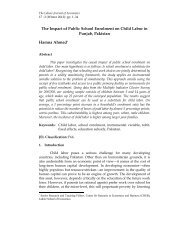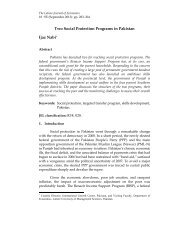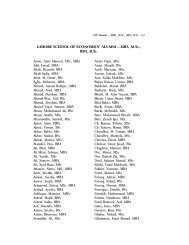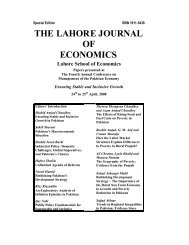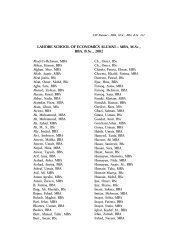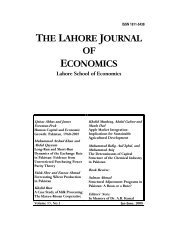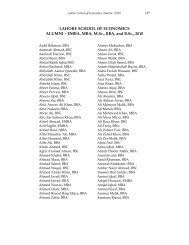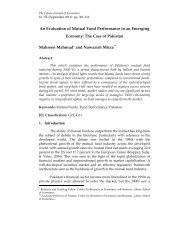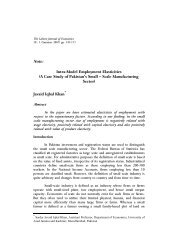Special Edition-07.pdf - Lahore School of Economics
Special Edition-07.pdf - Lahore School of Economics
Special Edition-07.pdf - Lahore School of Economics
You also want an ePaper? Increase the reach of your titles
YUMPU automatically turns print PDFs into web optimized ePapers that Google loves.
174<br />
Samina Shabir and Reema Kazmi<br />
industrialized and already developed countries, safeguarding and advancing<br />
their interests, thus further worsening the lot <strong>of</strong> the world’s poor. This<br />
failure or loss <strong>of</strong> credibility <strong>of</strong> the WTO has led developing countries to<br />
fend for their own interests in this increasingly integrated but regionalized<br />
world. Bilateral trading arrangements, although less preferred to multilateral<br />
ones, are one <strong>of</strong> the instruments employed by various countries, both<br />
developed and developing, to secure their export markets and to guarantee<br />
their trading activities in the future.<br />
Free Trade Agreements (FTAs) are a common type <strong>of</strong> bilateral<br />
arrangement between two or more countries. FTAs facilitate the free flow <strong>of</strong><br />
trade and investment and bring about closer economic integration between<br />
the binding parties by eliminating tariff/restrictions on each other’s<br />
commodities. More than 60% <strong>of</strong> global trade, at the moment, is being<br />
channeled through bilateral and regional trading arrangements. At present,<br />
almost 300 such arrangements exist globally. The purpose <strong>of</strong> these FTAs is<br />
not only to serve the economic needs <strong>of</strong> two countries, but to also<br />
accommodate political motivations, or in other words, legitimatize trade<br />
between two coalition allies (the recent US – Panama FTA is an example). A<br />
host <strong>of</strong> industrialized countries have already established bilateral<br />
arrangements (e.g., EU, NAFTA etc.), mostly among themselves. With the<br />
realization <strong>of</strong> the growing importance <strong>of</strong> FTAs, some developing countries<br />
have also entered into these arrangements. The recently signed Pakistan -<br />
China FTA is a move in the same direction. With the growing importance <strong>of</strong><br />
emerging economies in South and East Asia, Asia Pacific and South America,<br />
Pakistan is aiming at strengthening its trading relations with the economies<br />
<strong>of</strong> those regions. With the growing importance attached to China as the<br />
fourth largest economy <strong>of</strong> the world as well as an immediate neighbor <strong>of</strong><br />
Pakistan, it is about time for Pakistan to think about strengthening its<br />
economic ties, apart from their already strong strategic and military<br />
relations. It was with this enthusiasm and aim in mind that Pakistan laid the<br />
foundation for an FTA arrangement with China in July, 2006.<br />
China being the fourth largest economy <strong>of</strong> the world, with a trade<br />
surplus <strong>of</strong> $30 billion and foreign exchange reserve <strong>of</strong> $1 trillion, has<br />
strategically moved from being a centrally planned to a market based<br />
economy. At the end <strong>of</strong> 2006, China's global trade exceeded $1.758 trillion.<br />
Pakistan in comparison, is an emerging economy with nominal GDP <strong>of</strong><br />
$128.5 billion, a trade deficit <strong>of</strong> $8.51 and foreign exchange reserves in<br />
excess <strong>of</strong> $13 billion. Given the disparity in the sizes and economies <strong>of</strong> these<br />
two countries, entering into an FTA arrangement at this point in time can<br />
lead to some very crucial implications for both the countries, especially for<br />
Pakistan. Thus, this paper attempts to explore the implications <strong>of</strong> the FTA



